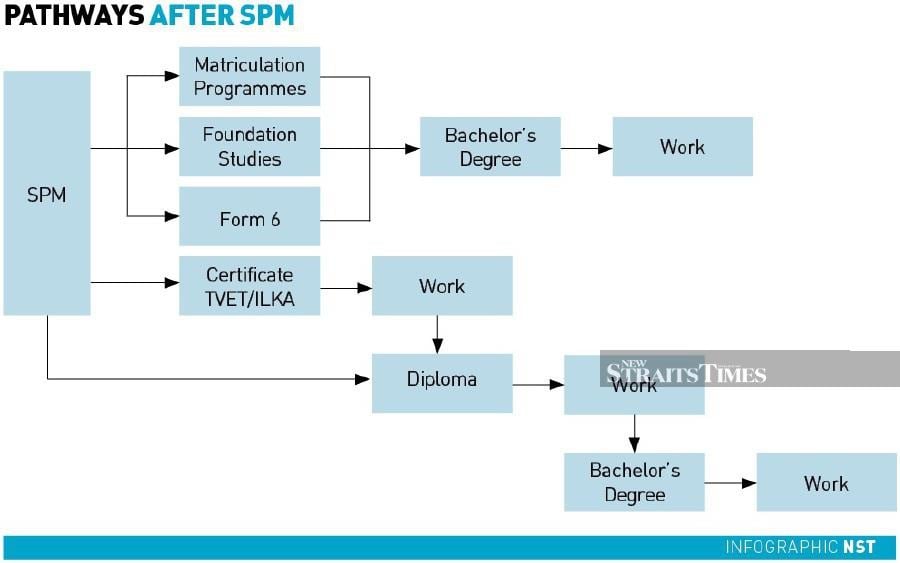Pathway After SPM - Academic or TVET?
What is your pathway after SPM? Whether academic or TVET, as a SPM school leaver, you must know what you want to become one day, what programmes to pursue, and what qualifications are needed to get into the programmes.
WITH Sijil Pelajaran Malaysia (SPM) just finished, you should begin planning your future and start looking at study options.
There is no lack of choice in terms of programmes at public and private higher-learning institutions that cater to you, whether hands-on or if you’re academically-inclined.
Education Ministry Higher Education Department deputy director-general Professor Datuk Dr Mohd Saleh Jaafar said there are many options for SPM school leavers like you.
“They include certificate courses, foundation studies, matriculation, diploma programmes & TVET courses at private and public universities, colleges, polytechnics, community colleges and skills training institutes.
“Others include degrees offered by the Malaysian Institutes of Teaching Education (IPGM),” he said.
“There is also Form 6, where school leavers can enter university after sitting for Sijil Tinggi Persekolahan Malaysia (STPM).”
He said each option has its own merits.
“School leavers like you, either with SPM or STPM (or equivalent) qualification, must have in-depth discussion with your parents, family members, counselling teachers and seniors, perhaps, to gain information and gauge which option is best.
“You must take into account your own interest and what the future holds,” he said.
Chen Ai Koon, a counselor at SMK Seri Serdang in Seri Kembangan, Selangor, said there are basically two pathways after SPM.
The first is the pursuit of professional careers like medicine, accounting, engineering and architecture. Second is for those who are keen on skills-based jobs.
The first pathway after SPM, she said, involves taking up pre-university programmes like matriculation, foundation studies or Form 6.
The second is the technical and vocational education and training – TVET pathway, which involves taking up certificate and diploma courses that offers Sijil Kemahiran/Diploma Kemahiran Malaysia, which are also MQA recognized.
“The main aim of a diploma programme is to produce a semi-professional workforce.
“A diploma gives an opportunity for SPM school leavers like you who did not qualify for pre-university studies to be trained for the working world.
“However, if you can prove that you are able to excel in studies, you will have the opportunity to continue to a bachelor’s degree. It is important to note that this is not an automatic process.”
To decide on the pathway, Chen said SPM you must know what you want to become one day, what programmes to pursue, and what qualifications are needed to get into the programmes.
Saleh said when choosing between a public and private university, both have their own strengths and specialties.
“The quality of universities can be seen in the QS World University Rankings and local MyQuest Rating.
“You should choose your programmes wisely by looking into the prospective university’s QS World ranking and MyQuest Rating scores. The quality of programmes should be a key factor.
“In addition, you should consider your financial ability to ensure that you are not burdened with problems during studies and after graduation.”
Saleh said tuition fees at public universities are subsidised by the government to help students obtain high-quality education at a low cost.
There are also sponsorships provided by government agencies, such as the Public Service Department and Education Ministry scholarship department.
“Besides those, private entities like Yayasan Tenaga National, Petronas, Telekom Malaysia and Bank Negara Malaysia also offer their own scholarships.
“This initiative will help poor, deserving students obtain a higher education,” he said.
On the prospects of SPM school leavers enrolling directly in higher education institutions, Saleh said looking at the past three years’ trend, there is a better success rate.
“A total of 50.1 per cent of eligible SPM candidates were offered a seat in the 2017/2018 academic session. This percentage increased to 86.5 in the 2018/2019 academic session.
“However, for the 2019/2020 academic session, only 69.09 per cent were offered places in certificate, foundation and diploma programmes at public universities, polytechnics, community colleges and skills training institutes,” he said.
For 2020, I am expecting to see higher demand for TVET programmes since the government is focusing on initiatives that produce highly-skilled workers to cater to the Fourth Industrial Revolution.
This is the time for school leavers to grab the opportunities. Choose what is best for you. Don’t close your door to TVET pathway.
EDUCATION MINISTRY HIGHER EDUCATION DEPARTMENT DEPUTY DIRECTOR-GENERAL PROFESSOR DATUK DR MOHD SALEH JAAFAR
Comment:
Based on the mid-term review of 11th Malaysia Plan, Graduate employability rate for higher education has improved steadily over the years from 76.1% in 2015 to 79.1% in 2017. Nevertheless, feedback from industry highlighted that graduates lacked problem-solving and communication skills. Moreover, the percentage of graduates employed in the semi-skilled job category increased from 28.2% in 2015 to 35.2% in 2017 implying a mismatch and underemployment.
That could mean that there’s more demand for TVET graduates going forward and if you/your child is non-academically inclined, do not force yourself/them to go towards higher education which is of academic-oriented. Instead, consider TVET pathway – polytechnics, community colleges, public and private skill training institutes.
And later on, you/they can always pursue a diploma or degree after working.
And if you’re in the private sector, there’s now a faster & easier way to pursue a (professional) diploma or (executive) degree if you are a TVET graduate with SKM/DKM qualification, even without SPM!



1) Would like to know further for Diploma.
2) Where to apply to join TVET for Diploma?
Hi Norasidah, do you mean Diploma Kemahiran Malaysia?
Do you have SKM3 already?
Fresh school leaver or with many years of experience in a particular field?